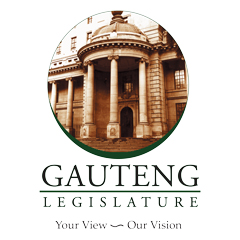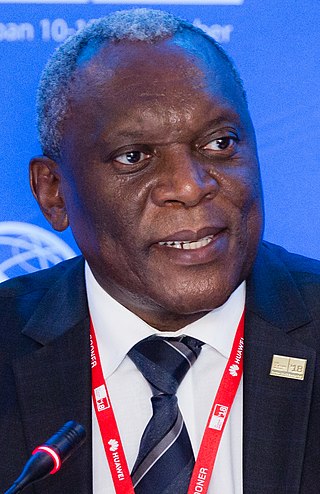The Republic of South Africa is a unitary parliamentary democratic republic. The President of South Africa serves both as head of state and as head of government. The President is elected by the National Assembly and must retain the confidence of the Assembly in order to remain in office. South Africans also elect provincial legislatures which govern each of the country's nine provinces.

The president of South Africa is the head of state and head of government of the Republic of South Africa. The president directs the executive branch of the government and is the commander-in-chief of the South African National Defence Force. Between 1961 and 1994, the office of head of state was the state presidency.

The Parliament of the Republic of South Africa is South Africa's legislature; under the present Constitution of South Africa, the bicameral Parliament comprises a National Assembly and a National Council of Provinces. The current twenty-eighth Parliament was first convened on 14 June 2024.

The United Christian Democratic Party is a minor political party in South Africa. It was founded by Lucas Mangope, leader of the Bophuthatswana bantustan in 1997, as a successor to the Tswana National Party, and led by him for the first fifteen years of its existence. Mavis Matladi was elected as its leader on 29 January 2011 after the expulsion of Mangope. Matladi died in December 2011. Isaac Sipho Mfundisi was elected president on Saturday, 7 January 2012.

General elections were held in South Africa on Wednesday, 14 April 2004. The African National Congress (ANC) of President Thabo Mbeki, which came to power after the end of the apartheid system in 1994, was re-elected with an increased majority.
Elections in South Africa are held for the National Assembly, National Council of Provinces, provincial legislatures and municipal councils. Elections follow a five-year cycle, with national and provincial elections held simultaneously and municipal elections held two years later. The electoral system is based on party-list proportional representation, which means that parties are represented in proportion to their electoral support. For municipal councils there is a mixed-member system in which wards elect individual councillors alongside those named from party lists.

The National Assembly is the directly elected house of the Parliament of South Africa, located in Cape Town, Western Cape. It consists of four hundred members who are elected every five years using a party-list proportional representation system where half of the members are elected proportionally from nine provincial lists and the remaining half from national lists so as to restore proportionality.

Grace Naledi Mandisa Pandor is a South African politician, educator and academic who served as the Minister of International Relations and Cooperation until 2024. She also served as a Member of Parliament (MP) for the African National Congress (ANC) since 1994.

General elections were held in South Africa on 22 April 2009 to elect members of the National Assembly and provincial legislatures. These were the fourth general elections held since the end of the apartheid era.

The 25th South African Parliament was the fourth Parliament of South Africa to convene since the introduction of non-racial government in South Africa in 1994. It was elected in the general election of 22 April 2009, and first met on 6 May of that year to elect Jacob Zuma as the fourth President of South Africa. It was formally opened by the newly elected President's State of the Nation address in a joint sitting on 3 June 2009. The ANC retained its majority, although it was reduced to 264 seats out of 400 (66%) in the National Assembly, while the Democratic Alliance increased its lead of the opposition, taking 67 seats (16.75%). The Speaker of the National Assembly was Max Sisulu of the ANC and the Chairperson of the National Council of Provinces was M. J. Mahlangu, also of the ANC.

The Gauteng Provincial Legislature is the legislature of the South African province of Gauteng. It is a unicameral body of 80 members elected every five years. The current legislature, the seventh, was elected on 29 May 2024 and is a hung parliament with no overall majority for any party, with the African National Congress having lost its previous majority, but remaining the largest party with 28 members. The legislature is housed in Johannesburg City Hall in central Johannesburg.

Siyabonga Cyprian Cwele is a South African politician who served in the cabinet of South Africa from September 2008 to May 2019, most recently as the Minister of Home Affairs between 2018 and 2019. He was appointed as the South African Ambassador to China in December 2020. He is a member of the African National Congress (ANC) and represented the party in Parliament from 1994 to 2019.
Mcebisi Skwatsha is a politician from the Western Cape. He is currently serving as the Deputy Minister of Agriculture, Land Reform and Rural Development since May 2019. Before that portfolio was established, he was Deputy Minister of Rural Development and Land Reform from 2014 to 2019.

Willem Frederik Faber is a South African businessman and politician who served as a Member of the National Assembly from May 2019 until April 2024. Prior to serving in the NCOP, he was a permanent delegate to the National Council of Provinces, the upper house of Parliament, from May 2009 to May 2019. Faber is a member of the Democratic Alliance (DA).
Samantha Jane Graham is a South African politician from the Eastern Cape who was elected to the National Assembly of South Africa in the 2019 general election as a member of the Democratic Alliance. Graham has been the party's Shadow Minister of Electricity since 2023. Graham served as the shadow deputy minister of public works and infrastructure from 2019 to 2020 and as the shadow minister for the portfolio between 2020 and 2023. She is a former councillor of the Dr Beyers Naudé Local Municipality.
Claudia Nonhlanhla Ndaba is a South African politician. A member of the African National Congress, she has served as the Chairperson of the Portfolio Committee on Women, Youth and People with Disabilities since 2019 and has been a Member of the National Assembly of South Africa since 2014. She served as Chairperson of the Ad Hoc Committee on the Filling of Vacancies in the Commission for Gender Equality twice during her first term in parliament. Prior to her election to parliament, Ndaba served as a Member of the Gauteng Provincial Legislature from 2009 to 2014.
Beauty Nomvuzo Dlulane is a South African politician who is currently serving as the chairperson of the Portfolio Committee on Sports, Arts and Culture in the National Assembly of South Africa. She has represented the African National Congress (ANC) in Parliament since 1997. Between 2012 and 2022, she was also a member of the National Executive Committee of the ANC.
This page is based on this
Wikipedia article Text is available under the
CC BY-SA 4.0 license; additional terms may apply.
Images, videos and audio are available under their respective licenses.












